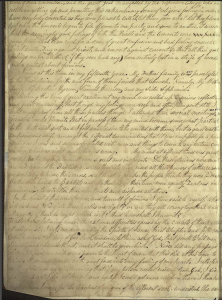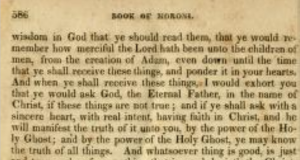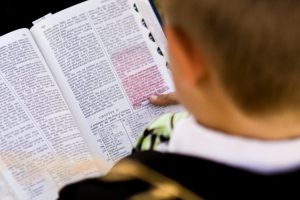In philosophical terms, Joseph’s first vision is epistemological (e-pis-tem-a-loj-i-cal). Epistemology is the philosophy of knowing. It seeks answers to such questions as: What is knowledge? What do I know? How do I know? Joseph’s vision is about knowing. “How to act I did not know,” he said about his pre-vision self. But after the vision he knew. “I had seen a vision, I knew it, and I knew that God knew it.”

This post is also epistemological
I’m asking, what can be known of Joseph’s experience and how? I recognize that there are severe limits on what I can know about the vision and how. But there are things I can know and some good methods of knowing. So I’m seeking answers based on the historical method and on spiritual experience.
We can only know through Joseph
He was the only witness. He created the evidence we have to evaluate. It is best to seek learning by faithfully studying Joseph’s accounts. It is worst to assume what his experience must have been like and how he would respond to it. But that’s exactly what many people do.

Many people do hypothetical history
That’s when a person imagines how the past should have been rather than working to discover how it actually was. One problem with hypothetical history is that it’s easy to disprove. For example, without ever looking at the evidence, some assume that if Joseph saw God and Christ he would obviously tell his family right away. He would remember his precise age at the time. He would write the experience immediately. And surely he would relate it the same every time he told it. None of those assumptions is supported by Joseph’s accounts of his vision.
Joseph’s way of knowing can be our way of knowing
In other words, if we seek as Joseph did, we can come to know what he knew as he knew. A well-known statement of this is Moroni 10:3-5 in the Book of Mormon. Sometimes people sum up this passage as, “just pray about it,” but those few words hardly capture the formula, which includes more than one hundred carefully chosen words. It says you need two ingredients to begin: someone’s testimony or statement, and the ability to test its veracity. We must have the testimony in order to verify it. But simply knowing about a testimony is not the same as knowing that it is true. So Moroni says we have to do extensive brain work: reading, remembering, pondering, all with real intent or focused purpose. We also have to add spiritual work: faith in Jesus Christ, sincerity, prayer. When a seeker invests all of the required elements—intellectual and spiritual—the promise is that “by the power of the Holy Ghost ye may know the truth of all things” (Moroni 10:5).


An early Latter-day Saint newspaper article explained this way of knowing
“Search the revelations which we publish, and ask your heavenly Father, in the name of his Son Jesus Christ, to manifest the truth unto you, and if you do it with an eye single to his glory, nothing doubting, he will answer you by the power of his Holy Spirit: You will then know for yourselves and not for another: You will not then be dependent on man for the knowledge of God.”
The principle of independent verification by revelation
That’s how Dallin H. Oaks described this epistemology. Simply put, it’s seeking. There are other ways to think about knowledge. Rationalism and the scientific method emphasize observation and the intellect but discount spiritual possibilities or dimensions of knowing. These epistemologies are good at revealing proximate truths but fail when it comes to knowing ultimate ones. They can’t verify the existence of God, or whether he appeared to Joseph in a grove.
These ways of knowing are appealing
They provide satisfying certainty about perplexing problems like the causes of sickness or natural disasters. They are good at explaining how, but incapable of ultimately explaining why some things happen. They are powerless to verify or disprove Joseph Smith’s testimony of his first vision. People who think in these ways alone can assume, as one scholar did that “the revelation to Moses as recorded in the Old Testament can hardly be taken literally as an event in which the Divine handed over or dictated to Moses Ten Commandments,” but he doesn’t know that. He stated it forcefully as a foregone conclusion but it’s still just a personal opinion based on his assumption about what is possible.
Agnosticism, or not knowing, is another alternative
It is the conviction that ultimate things are unknowable. As with Joseph Smith’s epistemology, agnosticism is based on personal experience, or lack thereof, with God. Agnostics know that they don’t know, and some agnostics assume that no one else knows either.
From all the alternative ways of knowing, Joseph Smith chose to be a seeker
The Oxford English Dictionary defines seek as to approach or draw near to God in prayer. It defines a seeker as “a searcher, and explorer, one who endeavors to find something hidden or lost, as in seeker after truth.” Joseph Smith recognized that he lacked the ultimate knowledge of salvation. He desired it badly. He thought, read, observed, analyzed, and finally prayed to find it. He worked hard for it. He struggled. Seeking is active, not passive. Seeking is not spiritual or intellectual. Seeking is spiritual and intellectual. Seeking requires the whole soul, all of one’s faculties. Seeking is the investment of one’s best brain work, spiritual sensitivities, moral judgments, and emotional vulnerabilities. Seeking is humble. Seeking is hard. And seeking is ultimately satisfying.
Assuming is the enemy of seeking
Assume has many definitions. The ones meant here are to pretend to possess, to put forth claims or pretensions, to take for granted as the basis of argument or action, to suppose. To assume is to avoid the hard work of seeking. Assumptions are not knowledge, but often those who hold them do not discern the difference. At best, assumptions are hypotheses—the beginning, not the end, of knowledge. At worst, assumptions masquerade as knowledge, pacifying those who hold them and keeping them from seeking. Assumptions thus prevent us from ultimate knowing. Assuming is intellectually and spiritually lazy. It is arrogant. It is easy. And, though temporarily attractive, it is ultimately unsatisfying and it can be spiritually devastating.
D&C 88:118: “And as all have not afaith, seek ye diligently and bteach one another words of cwisdom; yea, seek ye out of the best dbooks words of wisdom; seek learning, even by study and also by faith.”
Seeking is a commandment
Over and over the scriptures enjoin us to seek. A single verse, Doctrine and Covenants section 88:118, commands three times that we should seek. It tells us why to seek: because we lack faith. It tells us what to seek: learning. It tells where to seek: out of the best books. It tells us how to seek: diligently, as well as by study and also by faith. Similar instructions are everywhere in the scriptures. Sometimes the command to seek is modified by an adverb, as in seek diligently, or seek earnestly (D&C D&C 46:6, 88:118). Sometimes we are told what to seek (Amos 5:4-6, 14; D&C 6:16; 11:7, 21; 25:10; 46:8, 88:118; Jacob 2:18). Sometimes the scriptures say what not to seek (D&C 6:7; 11:7; 22:4; 66:10; Jacob 4:10; Alma 39:14). Some of the most beautiful passages are the ones that attach specific promises to seeking. “Seek the Lord, and ye shall live,” says one (Amos 5:6), an if/then formulation reiterated in the Doctrine and Covenants: “Seek the face of the Lord always, that in patience ye may possess your souls, and ye shall have eternal life” (101:38; see also 11:23, 88:83). Seeking is the means to knowing God. We could spend a long time profitably studying the scriptures that teach us how and what and where to seek.
There are no scriptural instructions to assume
This philosophical and dictionary work has a lot to do with the way we decide to study Joseph Smith’s first vision. Anyone concerned about knowing whether Joseph told the truth approaches the issue either as a seeker or as an assumer. A seeker comes to the quest open-minded, open-hearted, desiring to know whether and in what ways Joseph’s testimony is true and willing to use any means—spiritual and intellectual—to gain that knowledge. An assumer, whether believing or unbelieving, pre-supposes that they have knowledge. What more is there for them to learn? They are narrow-minded, closed to at least some of the possible means of knowing. Rather than hold assumptions tentatively and subject them to testing and verification, assumers have already arrived at the conclusion. They do not want to know any more. They do not seek to know every bit of evidence Joseph left us, asking what it might reveal. Rather, they pick and choose bits that match their assumptions.
The historical method
Is the means that seekers can use to gain knowledge of the accounts of Joseph’s vision. It is a disciplined way of thinking that identifies and sorts different kinds of information. It seeks knowledge of the past from those who created the knowledge. It discerns the difference between historical facts and interpretations of the facts or opinions about them. Historical facts are pieces of knowledge about the past than can be verified, and that are the same regardless of how one chooses to interpret them.
Here are some historical facts
- Joseph Smith, Jr., son of Lucy Mack and Joseph Smith, was born in Vermont in 1805
- Several documents created by Joseph Smith and his associates declare that he experienced a vision
- These documents were written in the 1830s and 1840s
Those are historical truths that can be verified using the historical method. Notice, however, how little these facts actually reveal. The historical method is limited. It can tell us whether Joseph Smith was born in Vermont in 1805. It cannot tell us whether he was visited by God in New York in 1820. It can show us several documents that testify that Joseph envisioned heavenly beings. It cannot tell us whether his testimony is true or false. It can prove that the documents were written in the 1830s and 40s. It cannot prove whether they accurately represent Joseph’s experience in the grove. The historical facts do not prove or disprove whether Joseph experienced a vision.
Seekers need more than the historical method
The combination of seeking by study and by faith enables seekers to discern whether Joseph’s accounts tell the truth. The foremost historians of the first vision are seekers of the study and faith variety. They are disciplined, highly skilled students of the historical method who were trained in esteemed universities. And they choose to exercise faith in Jesus Christ and seek to know by spiritual and intellectual means.
What about people who lose their faith after learning of the multiple first vision accounts
I have visited with and studied many of these sincere souls. Compared to the first vision scholars, they are ignorant of the evidence and of the historical method of studying it. They are generally poorly-informed people who assumed they were well-informed. Their crisis of faith began when they encountered evidence that overturned their assumptions. They did not practice a disciplined method of seeking. They did not seek by diligent, systematic study as well as by faith. Googling is not a synonym for seeking, nor is depending on secondary evidence or antagonistic witnesses. The hard work of seeking by study and by faith often prevents the painful process these people experience.
Joseph was a seeker
He not only created historical documents that testify that he experienced a heavenly vision. He also left us evidence of his effective epistemology, his way of knowing. By richly documenting his first vision, Joseph gave us a testimony to verify and illustrated how it could be done.
In 2020, I’ll post all year about Joseph Smith’s First Vision and the Book of Mormon. Subscribe if you’re a seeker, or want to be. Leave me a comment if you have questions about the First Vision or the Book of Mormon you want to discuss. Finally, share these posts with anyone you think they might edify or help.

Hello Mr. Harper,
I fundamentally agree with you that Joseph Smith was a seeker, although our respective definitions of “seeker” may vary slightly.
Do you have any thoughts on his spiritual experiences as veridical in the context of entheogenic initiations and ritualism?
I’ve recently co-authored a paper titled “The Entheogenic Origins of Mormonism” and am curious what your thoughts might be on the subject. The Sunstone and John Whitmer presentations on the topic were very well received by many including Don Bradley and Barbara Jones Brown, even receiving criticism from inimitable Dan Vogel.
I’d love to hear back from you on the subject and hopefully spark up a dialogue about it in light of the historic coming year of 2020.
Be well,
-Bryce Blankenagel
Bryce,
I’ll read your paper. I don’t know anything about entheogenic studies, so will be interested to learn. Thanks, Steve
I love your writings and ideas. Thanks for sharing.
I have had the opportunity to visit the Sacred Grove and the other Church historical sites that provide the context for the First Vision and Joseph’s interactions with Moroni and tge Book of Mormon. The restoration of those lands and buildings tells the character of Joseph and his family as hard working farmers carving out wheat fields and apple orchards from virgin forest. It counteracts many of the false assumptions about Joseph that many people have adopted to try to explain his remarkable accounts and his amazing production of the Book of Mormon despite his utter lack of academic training as a scholar of the Bible or an author.